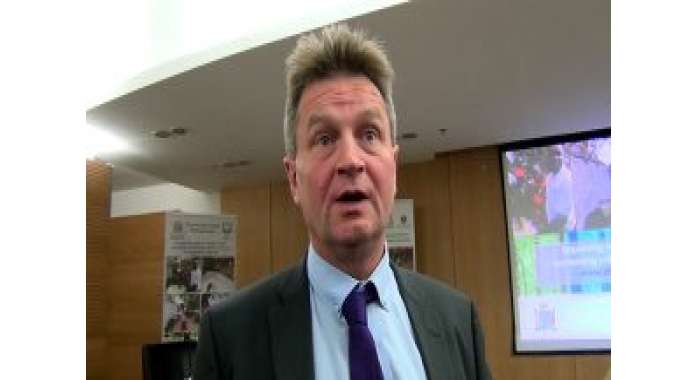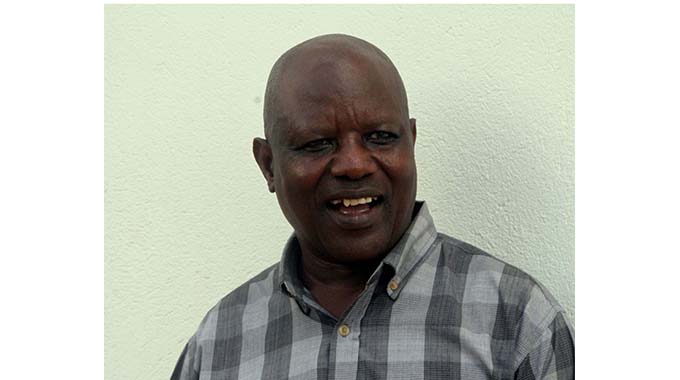EU supports agriculture project

Harare Bureau
The European Union (EU) Ambassador to Zimbabwe Timo Olkkonen has said his delegation wants the Zimbabwe Agricultural Growth Programme (ZAGP) to succeed.
ZAGP is a response to the challenges in Zimbabwe’s agriculture sector through a €40 million support package from the EU.
He was speaking during a recent visit to the Matopos Agricultural Centre of Excellence.
The centre was established by the Ministry of Lands, Agriculture, Fisheries, Water and Rural Development in partnership with the Zimbabwe Agriculture Knowledge and Innovation Systems (Zakis) project, which is a component of ZAGP.
“We are committed to supporting Zimbabwean agriculture and we want ZAGP to be a success,” said Mr Olkkonen.
“We want to see it making a change in terms of improved productivity, increased earnings for farmers and in terms of addressing the bottlenecks in how the markets operate.”
Agricultural Centres of Excellence are the focal points of the Zakis intervention.
They are tasked with demonstrating best practices in crop and livestock production while providing research and knowledge sharing services to students and farmers.
They were established at Matopos Research Institute and Chibero Agricultural College.
These two main centres are complemented by ZimAgriHub, a virtual centre of excellence, and the District Agricultural Centres of Excellence which are located at Matobo, Chegutu, Insiza and Mhondoro-Ngezi.
Speaking on the Ambassador’s visit, the acting chief director of Agricultural Research, Innovation and Development Directorate, Dr Dumisani Kutywayo said, “The Agricultural Centres of Excellence that were developed by Zakis are a shot in the arm in terms of government’s development trajectory where we expect the transformation of the agriculture sector in line with Vision 2030. The Zakis project is an instrumental stimulus to the transformation of the agric sector in Zimbabwe because it strengthens Research and Development.
“It also harmonises the sharing of knowledge among the key Government services of agricultural research, education and extension, which has a downstream impact on the economy.”
The Matopos Agricultural Centre of Excellence is focused on livestock productivity, pasture research and the development of small grain seed varieties.
The head of the Matopos Research Institute Mr Tendai Dominic Matekenya said, “The coming in of the Zakis project has improved our work output in terms of funding the research protocols, improving the infrastructure and even mobility.
“We now have a modern laboratory which was refurbished and equipped with the latest technology.”
The laboratory analyses on-farm feed ingredients and fodder samples for nutritional value.
This helps farmers to grow the fodder and formulate the on-farm feeds that improve the productivity of their animals.
In line with the Zakis mandate to harmonise agricultural research, education and extension, the results from the laboratory are relayed to the farmers through ward-based extension officers.
The laboratory research officer at Matopos, Mrs Theresa Rukuni, said that the new equipment that was brought by Zakis improved the efficiency of the laboratory’s operations.
“We now have the capacity to process 20 samples per day where in the past we could only manage two samples per day,” she said. “Also, the turnaround time for delivering results has been reduced from two weeks to three days.”
Mrs Rukuni said since August last year, the laboratory has analysed 236 feed samples for broilers, cattle, small ruminants, and rabbits.
Commenting on the development, Ambassador Olkkonen said, “What I have seen here are signs that the project is picking up momentum as indicated by the increased demand for laboratory services and the progress that has been made on the chicken feed project. This is encouraging, and I do hope that the uptake will continue to increase.”
The Matopos Agricultural Centre of Excellence also develops new and improved high yield varieties of pearl millet, finger millet and sorghum.
The traditional grains crop breeder at the centre, Ms Tendai Mukondwa said Zakis provided the funding to set up trials at the farmers’ fields.

Mr Tendai Dominic Matekenya
“Carrying out on-farm crop trials is an important step that must be undertaken before a variety is released to the market,” she said. “Seed regulations require us to have the trials on a minimum of five on-farm sites before a variety is released and sold commercially.
“We were facing challenges in this respect and Zakis has enabled us to involve more farmers in the release process. During the last growing season, we reached 16 farmers in Matobo, Insiza and Chegutu.”
Zakis seeks to improve Zimbabwe’s agriculture sector by enhancing the dissemination of agricultural knowledge and stimulating innovation through strengthening the working links among agricultural research, education, and extension services.
The project is implemented by a consortium of local and international agricultural specialist NGOs, comprising Welthungerhilfe (WHH), International Crops Research Institute for the Semi-Arid Tropics (ICRISAT), Community Technology Development Organisation (CTDO), and Sustainable Agriculture Technology (SAT).











Comments